IE 11 is not supported. For an optimal experience visit our site on another browser.
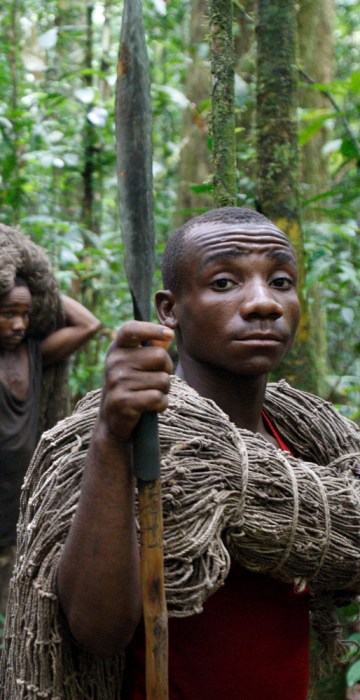
Africa
Pygmies join bushmeat trade, threatening own culture
Experts warn the voracious demand for bushmeat could drive some of Africa's last hunter-gatherers to eradicate the very wildlife that sustains them, and with it, their own forest-dwelling existence.
/ 10 PHOTOS

In this March 18, 2010 photo, Mbuti pygmy men, from left, Faizi Malambi, Kawaya Situka, Besei, and Kange Ambali carry their hunting nets and spears as they await the start of the day's hunt, in the Okapi Wildlife Reserve outside the town of Epulu, Congo. The pygmies traditional practice of hunting bushmeat has devolved into an all-out commercial endeavor, staged not for subsistence, but to feed growing regional markets. The result: the forests, those that remain, are growing emptier by the day. (AP Photo/Rebecca Blackwell)
— Rebecca Blackwell / AP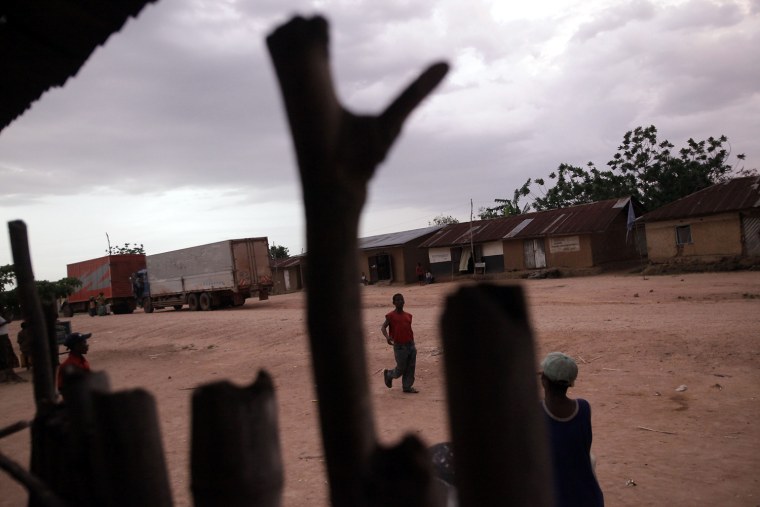
In this March 26, 2010 photo, people walk down the main street of Epulu, Congo, the only village in the heart of the Okapi Wildlife Reserve. The village used to be virtually inaccessible, but improvements to the road have produced a steady supply of truck traffic and increased the demand for bushmeat. The pygmies' traditional practice of hunting bushmeat has devolved into an all-out commercial endeavor - staged not for subsistence, but to feed growing regional markets. The result: the forests, those that remain, are growing emptier by the day. (AP Photo/Rebecca Blackwell)
— Rebecca Blackwell / AP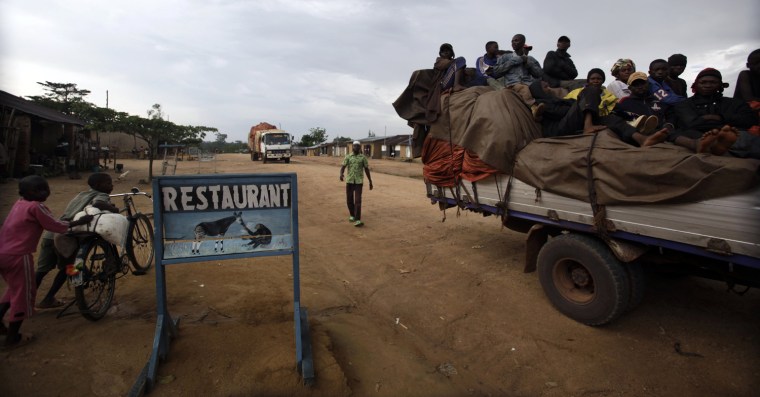
In this March 25, 2010 photo, a truck loaded with passengers stops outside a restaurant serving bush meat, in the town of Epulu, Congo in the heart of the Okapi Wildlife Reserve. The pygmies' traditional practice of hunting bushmeat has devolved into an all-out commercial endeavor, staged not for subsistence, but to feed growing regional markets. The result: the forests, those that remain, are growing emptier by the day. (AP Photo/Rebecca Blackwell)
— Rebecca Blackwell / AP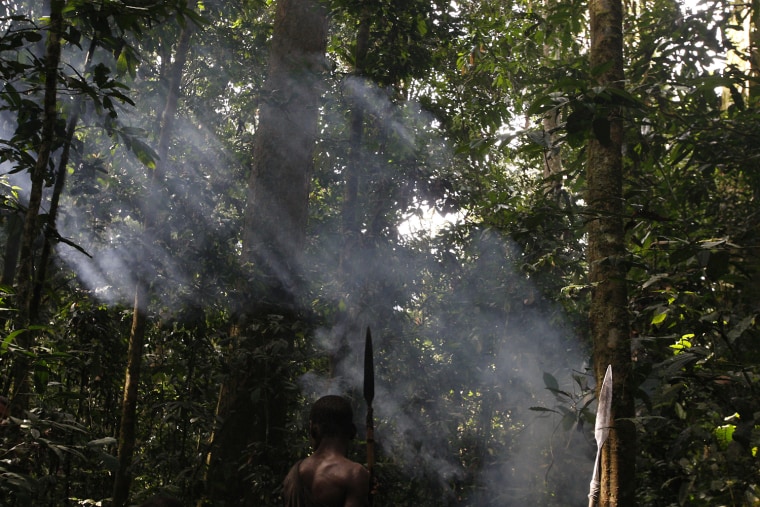
In this March 20, 2010 photo, an Mbuti pygmy hunter arrives at the morning ceremonial fire which starts each hunting day, in the Okapi Wildlife Reserve outside the town of Epulu, Congo. The pygmies' traditional practice of hunting bushmeat has devolved into an all-out commercial endeavor, staged not for subsistence, but to feed growing regional markets. The result: the forests, those that remain, are growing emptier by the day. (AP Photo/Rebecca Blackwell)
— Rebecca Blackwell / AP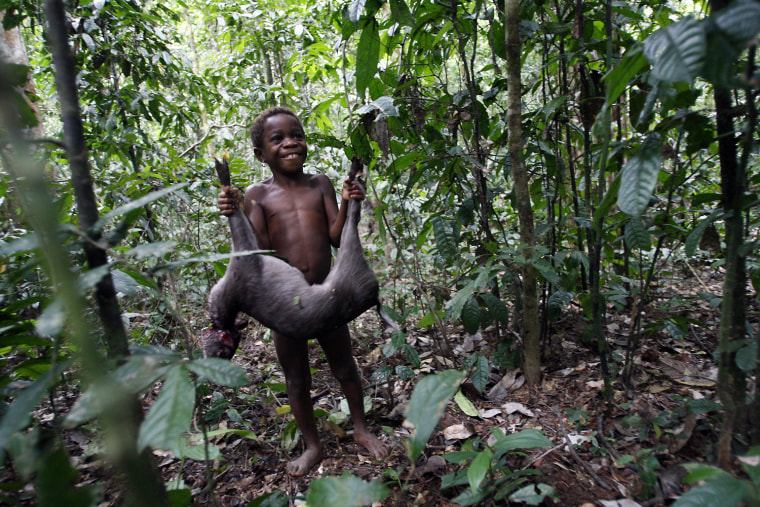
In this March 21, 2010 photo, Mbuti girl Tunduoloki Harriet excitedly holds up a forest antelope caught by a male relative in the Okapi Wildlife Reserve outside the town of Epulu, Congo. The pygmies' traditional practice of hunting bushmeat has devolved into an all-out commercial endeavor - staged not for subsistence, but to feed growing regional markets. The result: the forests, those that remain, are growing emptier by the day. (AP Photo/Rebecca Blackwell)
— Rebecca Blackwell / AP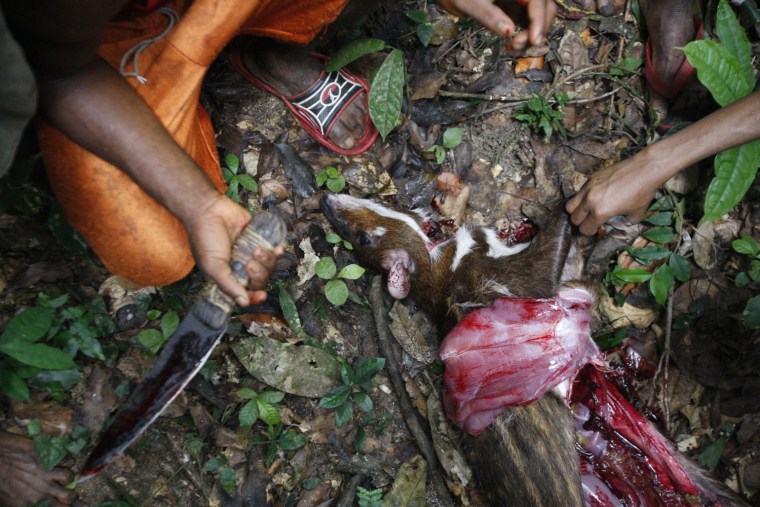
In this March 21, 2010 photo, pygmies divide up the meat of a red duiker amongst the men who helped to trap it, in the Okapi Wildlife Reserve outside the town of Epulu, Congo. The pygmies' traditional practice of hunting bushmeat has devolved into an all-out commercial endeavor, staged not for subsistence, but to feed growing regional markets. The result: the forests, those that remain, are growing emptier by the day. (AP Photo/Rebecca Blackwell)
— Rebecca Blackwell / AP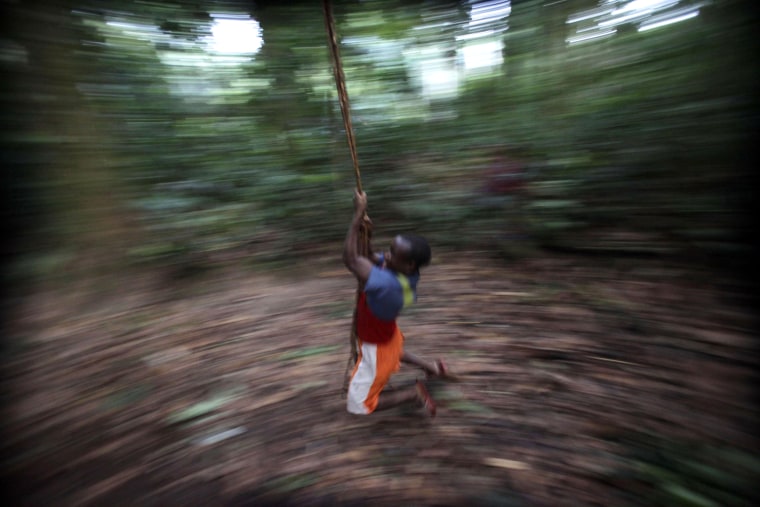
In this March 21, 2010 photo, Mbuti pygmy Kange Ambali takes a turn swinging on a vine found near the hunting camp at Biyamati, in the Okapi Wildlife Reserve, outside Epulu, Congo. The pygmies' traditional practice of hunting bushmeat has devolved into an all-out commercial endeavor - staged not for subsistence, but to feed growing regional markets. The result: the forests, those that remain, are growing emptier by the day. (AP Photo/Rebecca Blackwell)
— Rebecca Blackwell / AP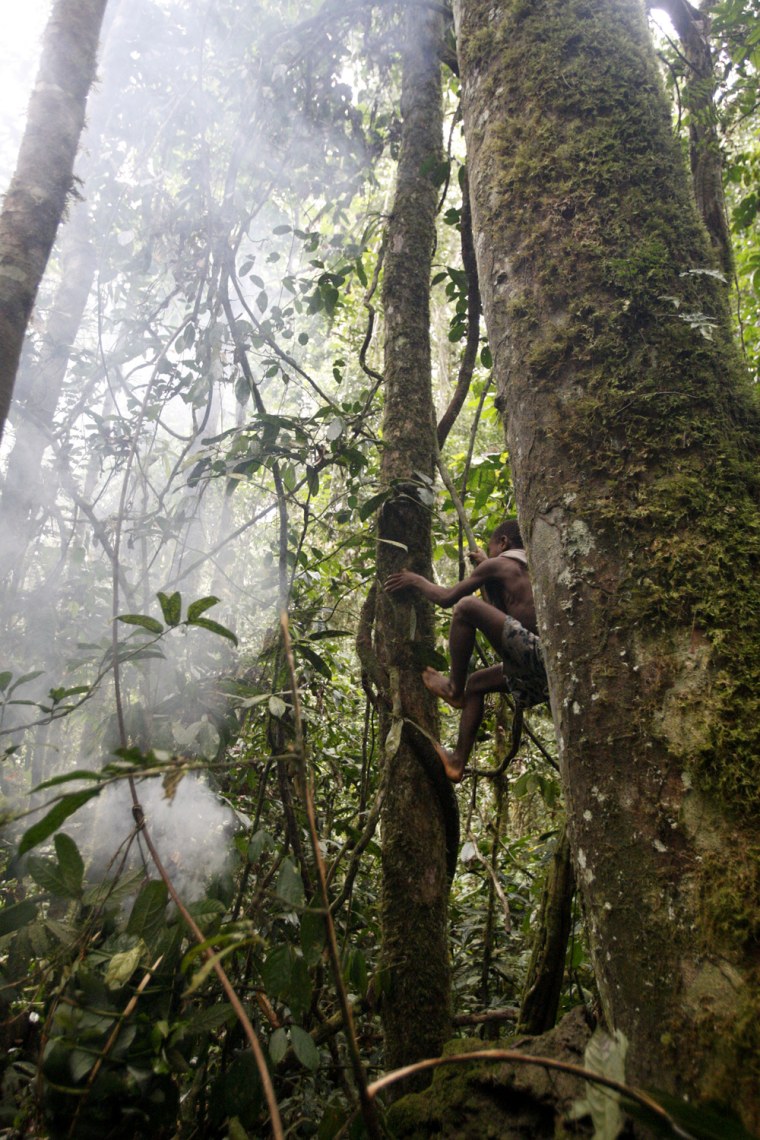
In this March 21, 2010 photo, Oskar Biteye, an Mbuti pygmy boy, climbs a tree along with other Mbuti men to retrieve honey, a prized delicacy, from a bees' nest more than 150 feet up, in the Okapi Wildlife Reserve outside the town of Epulu, Congo. Smoking leaves, bundled with a burning ember, are pulled up on an adjacent vine, will be used to subdue the bees before reaching in to remove the honeycombs. The pygmies' traditional practice of hunting bushmeat has devolved into an all-out commercial endeavor - staged not for subsistence, but to feed growing regional markets. The result: the forests, those that remain, are growing emptier by the day. (AP Photo/Rebecca Blackwell)
— Rebecca Blackwell / AP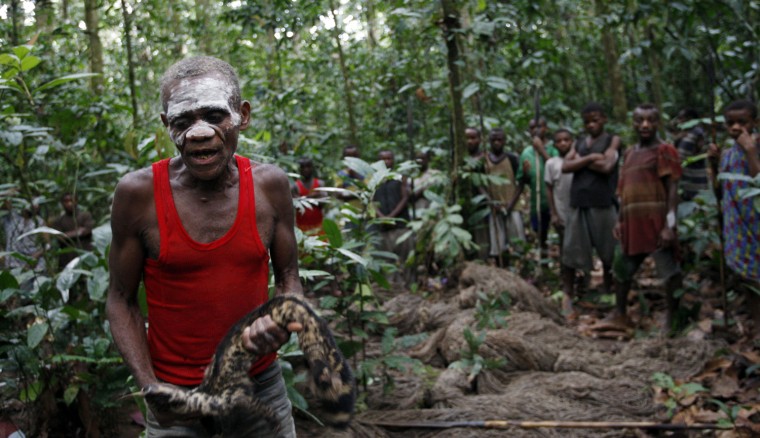
In this March 19, 2010 photo, Mbuti pygmy clan head Zaire Njikali leads a ceremony marking the move from one hunting camp to another in his family's traditional hunting grounds inside the Okapi Wildlife Reserve, outside the town of Epulu, Congo. The pygmies' traditional practice of hunting bushmeat has devolved into an all-out commercial endeavor - staged not for subsistence, but to feed growing regional markets. The result: the forests, those that remain, are growing emptier by the day. (AP Photo/Rebecca Blackwell)
— Rebecca Blackwell / AP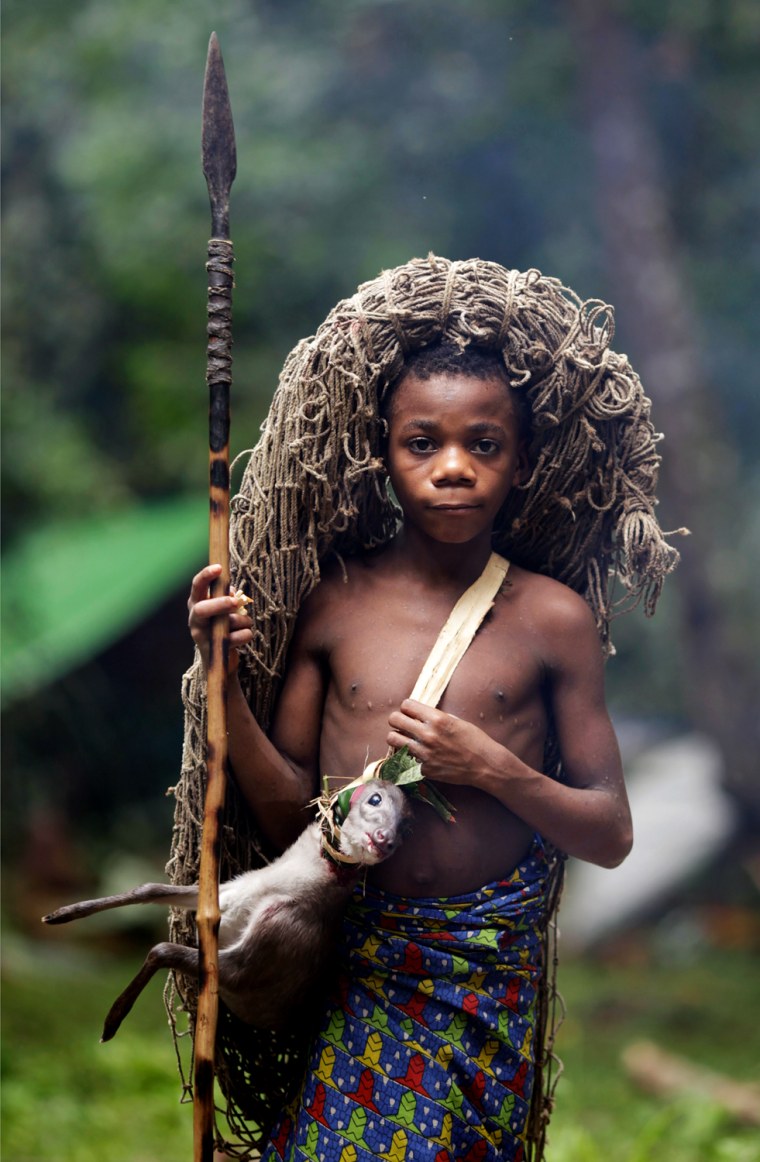
In this March 19, 2010 photo, Oskar Biteye, grandson of family chief Zaire and the group's youngest hunter, returns from the hunt with his day's catch, a forest antelope, in the Okapi Wildlife Reserve outside the town of Epulu, Congo. The pygmies traditional practice of hunting bushmeat has devolved into an all-out commercial endeavor, staged not for subsistence, but to feed growing regional markets. The result: the forests, those that remain, are growing emptier by the day. (AP Photo/Rebecca Blackwell)
— Rebecca Blackwell / AP1/10